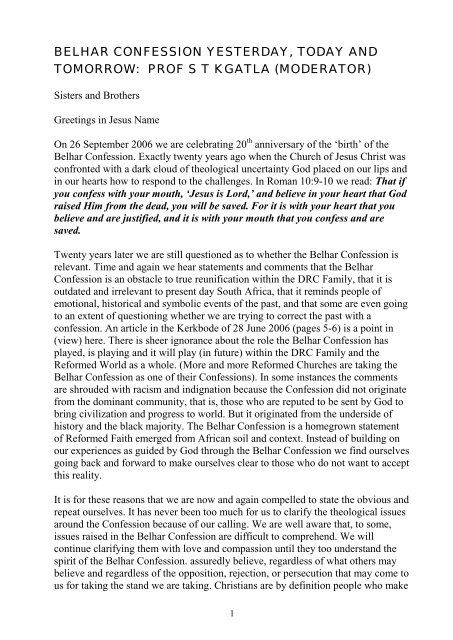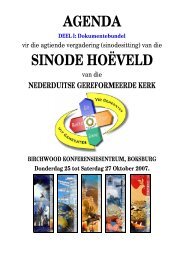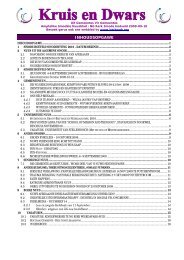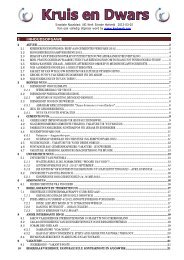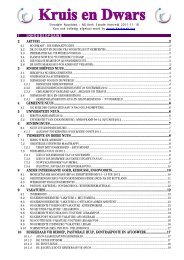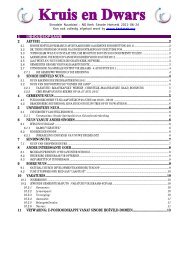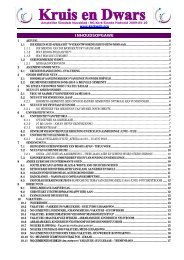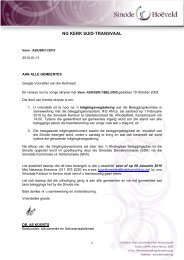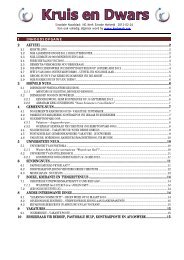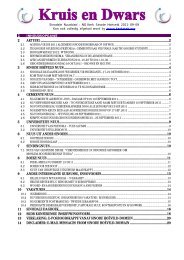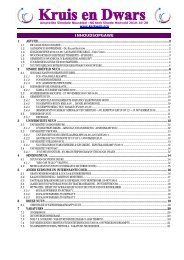belhar confession yesterday, today and tomorrow: prof st kgatla
belhar confession yesterday, today and tomorrow: prof st kgatla
belhar confession yesterday, today and tomorrow: prof st kgatla
Create successful ePaper yourself
Turn your PDF publications into a flip-book with our unique Google optimized e-Paper software.
BELHAR CONFESSION YESTERDAY, TODAY ANDTOMORROW: PROF S T KGATLA (MODERATOR)Si<strong>st</strong>ers <<strong>st</strong>rong>and</<strong>st</strong>rong> BrothersGreetings in Jesus NameOn 26 September 2006 we are celebrating 20 th anniversary of the ‘birth’ of theBelhar Confession. Exactly twenty years ago when the Church of Jesus Chri<strong>st</strong> wasconfronted with a dark cloud of theological uncertainty God placed on our lips <<strong>st</strong>rong>and</<strong>st</strong>rong>in our hearts how to respond to the challenges. In Roman 10:9-10 we read: That ifyou confess with your mouth, ‘Jesus is Lord,’ <<strong>st</strong>rong>and</<strong>st</strong>rong> believe in your heart that Godraised Him from the dead, you will be saved. For it is with your heart that youbelieve <<strong>st</strong>rong>and</<strong>st</strong>rong> are ju<strong>st</strong>ified, <<strong>st</strong>rong>and</<strong>st</strong>rong> it is with your mouth that you confess <<strong>st</strong>rong>and</<strong>st</strong>rong> aresaved.Twenty years later we are <strong>st</strong>ill que<strong>st</strong>ioned as to whether the Belhar Confession isrelevant. Time <<strong>st</strong>rong>and</<strong>st</strong>rong> again we hear <strong>st</strong>atements <<strong>st</strong>rong>and</<strong>st</strong>rong> comments that the BelharConfession is an ob<strong>st</strong>acle to true reunification within the DRC Family, that it isoutdated <<strong>st</strong>rong>and</<strong>st</strong>rong> irrelevant to present day South Africa, that it reminds people ofemotional, hi<strong>st</strong>orical <<strong>st</strong>rong>and</<strong>st</strong>rong> symbolic events of the pa<strong>st</strong>, <<strong>st</strong>rong>and</<strong>st</strong>rong> that some are even goingto an extent of que<strong>st</strong>ioning whether we are trying to correct the pa<strong>st</strong> with a<<strong>st</strong>rong>confession</<strong>st</strong>rong>. An article in the Kerkbode of 28 June 2006 (pages 5-6) is a point in(view) here. There is sheer ignorance about the role the Belhar Confession hasplayed, is playing <<strong>st</strong>rong>and</<strong>st</strong>rong> it will play (in future) within the DRC Family <<strong>st</strong>rong>and</<strong>st</strong>rong> theReformed World as a whole. (More <<strong>st</strong>rong>and</<strong>st</strong>rong> more Reformed Churches are taking theBelhar Confession as one of their Confessions). In some in<strong>st</strong>ances the commentsare shrouded with racism <<strong>st</strong>rong>and</<strong>st</strong>rong> indignation because the Confession did not originatefrom the dominant community, that is, those who are reputed to be sent by God tobring civilization <<strong>st</strong>rong>and</<strong>st</strong>rong> progress to world. But it originated from the underside ofhi<strong>st</strong>ory <<strong>st</strong>rong>and</<strong>st</strong>rong> the black majority. The Belhar Confession is a homegrown <strong>st</strong>atementof Reformed Faith emerged from African soil <<strong>st</strong>rong>and</<strong>st</strong>rong> context. In<strong>st</strong>ead of building onour experiences as guided by God through the Belhar Confession we find ourselvesgoing back <<strong>st</strong>rong>and</<strong>st</strong>rong> forward to make ourselves clear to those who do not want to acceptthis reality.It is for these reasons that we are now <<strong>st</strong>rong>and</<strong>st</strong>rong> again compelled to <strong>st</strong>ate the obvious <<strong>st</strong>rong>and</<strong>st</strong>rong>repeat ourselves. It has never been too much for us to clarify the theological issuesaround the Confession because of our calling. We are well aware that, to some,issues raised in the Belhar Confession are difficult to comprehend. We willcontinue clarifying them with love <<strong>st</strong>rong>and</<strong>st</strong>rong> compassion until they too under<strong>st</strong><<strong>st</strong>rong>and</<strong>st</strong>rong> thespirit of the Belhar Confession. assuredly believe, regardless of what others maybelieve <<strong>st</strong>rong>and</<strong>st</strong>rong> regardless of the opposition, rejection, or persecution that may come tous for taking the <strong>st</strong><<strong>st</strong>rong>and</<strong>st</strong>rong> we are taking. Chri<strong>st</strong>ians are by definition people who make1
their own <<strong>st</strong>rong>confession</<strong>st</strong>rong> known: ‘Jesus is Lord’ (Rom 10-9-10). The Chri<strong>st</strong>ianChurch, called <<strong>st</strong>rong>and</<strong>st</strong>rong> held together by Jesus Chri<strong>st</strong> Himself, lives only through thecontinual renewal of this fundamental <<strong>st</strong>rong>confession</<strong>st</strong>rong> of faith. A <<strong>st</strong>rong>confession</<strong>st</strong>rong> of faithmay thus be defined more precisely as a public declaration before God <<strong>st</strong>rong>and</<strong>st</strong>rong> theworld of what a church believes. It is an officially adopted <strong>st</strong>atementWhen Chri<strong>st</strong>ians make a <<strong>st</strong>rong>confession</<strong>st</strong>rong>, they say: ‘This is what we mo<strong>st</strong> of what acommunity of Chri<strong>st</strong>ians believes <<strong>st</strong>rong>and</<strong>st</strong>rong> wishes the world to know what they believe.A <<strong>st</strong>rong>confession</<strong>st</strong>rong>, a church affirmation of faith always has three reference points: God,The church itself, <<strong>st</strong>rong>and</<strong>st</strong>rong> The World. A <<strong>st</strong>rong>confession</<strong>st</strong>rong> of faith is fir<strong>st</strong>ly a solemn <<strong>st</strong>rong>and</<strong>st</strong>rong>thankful response to God’s self-revelation, expressed with a sense of responsibilityto be faithful <<strong>st</strong>rong>and</<strong>st</strong>rong> obedient to God. Secondly, in a <<strong>st</strong>rong>confession</<strong>st</strong>rong> of faith members of aChri<strong>st</strong>ian community seek to make clear to themselves who they are, what theybelieve, <<strong>st</strong>rong>and</<strong>st</strong>rong> what they resolve to do. Thirdly, Chri<strong>st</strong>ians confess their commonfaith not only to praise <<strong>st</strong>rong>and</<strong>st</strong>rong> serve God, <<strong>st</strong>rong>and</<strong>st</strong>rong> not only to e<strong>st</strong>ablish their self-identity,but also to speak to the world with a unified word that declares who they are <<strong>st</strong>rong>and</<strong>st</strong>rong>what they <strong>st</strong><<strong>st</strong>rong>and</<strong>st</strong>rong> for <<strong>st</strong>rong>and</<strong>st</strong>rong> again<strong>st</strong>.The Time in which The Belhar Confession came into beingThroughout the hi<strong>st</strong>ory of the Chri<strong>st</strong>ian era, churches have written <<strong>st</strong>rong>confession</<strong>st</strong>rong>s offaith because they were compelled to do so, not ju<strong>st</strong> because they thought it wouldbe a good idea, or acceptable to the world. But they did so fully aware that theworld would mo<strong>st</strong> probably hate <<strong>st</strong>rong>and</<strong>st</strong>rong> persecute them precisely because of the <strong>st</strong><<strong>st</strong>rong>and</<strong>st</strong>rong>they were taking. In some in<strong>st</strong>ances, <<strong>st</strong>rong>confession</<strong>st</strong>rong>s of faith resulted from a sense ofurgent need to correct some di<strong>st</strong>ortion of the truth <<strong>st</strong>rong>and</<strong>st</strong>rong> certain claims on the Gospelthat threatened the integrity of the Church’s faith <<strong>st</strong>rong>and</<strong>st</strong>rong> life within it (the church).The <<strong>st</strong>rong>confession</<strong>st</strong>rong> might result from some political or cultural movement outside theChurch that openly attacks or subtly seeks to compromise the Church commitmentto the Gospel. Sometimes the urgency to confess came from the Church’sconviction that it has a great insight into the promises <<strong>st</strong>rong>and</<strong>st</strong>rong> dem<<strong>st</strong>rong>and</<strong>st</strong>rong>s of the Gospelthat is desperately needed by both the Church <<strong>st</strong>rong>and</<strong>st</strong>rong> the World.In the case of the Belhar Confession all three scenarios played a crucial role in itsgenesis. There was a sense of urgent need to correct some di<strong>st</strong>ortion of the truth<<strong>st</strong>rong>and</<strong>st</strong>rong> the claim of the Gospel that threatened the integrity of the Church’s faith <<strong>st</strong>rong>and</<strong>st</strong>rong>life on one h<<strong>st</strong>rong>and</<strong>st</strong>rong>. Apartheid ideology was eroding the fundamental truth of theGospel. On the other it had been defended <<strong>st</strong>rong>and</<strong>st</strong>rong> ju<strong>st</strong>ified by the Church that broughtthe Gospel to South Africa. South Africans, particularly Blacks were on the vergeof forsaking <<strong>st</strong>rong>and</<strong>st</strong>rong> rejecting the Gospel because of what was being done to them. Thewhite churches were involved in practising heresy because of their theologicalju<strong>st</strong>ification of the sy<strong>st</strong>em. There was urgent need not only to correct the wrongteaching but also to provide Chri<strong>st</strong>ian authentic witness to the world. We are,however, thankful to God because the DRC has publicly denounced apartheid <<strong>st</strong>rong>and</<strong>st</strong>rong>apologized to the South Africans.2
The Belhar Confession was called for by the political <<strong>st</strong>rong>and</<strong>st</strong>rong> cultural movement,operating inside <<strong>st</strong>rong>and</<strong>st</strong>rong> outside the church, of the denial of human rights to the blackcitizens of the country. The church had to come up with a <<strong>st</strong>rong>confession</<strong>st</strong>rong> thatresponded to the challenges of the apartheid. The Church had a conviction that thepromises <<strong>st</strong>rong>and</<strong>st</strong>rong> dem<<strong>st</strong>rong>and</<strong>st</strong>rong>s of the Gospel were needed by both those who propagatedinju<strong>st</strong>ices again<strong>st</strong> black fellow citizens <<strong>st</strong>rong>and</<strong>st</strong>rong> the victims as well.The Belhar Confession was an appropriate response by <<strong>st</strong>rong>and</<strong>st</strong>rong> a voice of the blackChri<strong>st</strong>ians within the DRC Family in South Africa. It was a credible response to<<strong>st</strong>rong>and</<strong>st</strong>rong> critique of the ideologization of Chri<strong>st</strong>ianity in the core beliefs of the whitedominant culture of the time. It responded to the de<strong>st</strong>ructive experience of beingdominated <<strong>st</strong>rong>and</<strong>st</strong>rong> the incriminating experience of being the one who dominated <<strong>st</strong>rong>and</<strong>st</strong>rong>benefited from the domination of the other. It brought necessary clarification tohard <<strong>st</strong>rong>and</<strong>st</strong>rong> pressing theological que<strong>st</strong>ions of the time. The Black Youth wasdem<<strong>st</strong>rong>and</<strong>st</strong>rong>ing answers from their Chri<strong>st</strong>ian parents why they were belonging to aChurch of the oppressed. Black (reformed) parents were being criticized by theirkids <<strong>st</strong>rong>and</<strong>st</strong>rong> other Churches for being so naïve <<strong>st</strong>rong>and</<strong>st</strong>rong> belonging to the white DutchReformed Church that supported an ideology of apartheid <<strong>st</strong>rong>and</<strong>st</strong>rong> in that waylegitimized their own oppression. How on earth could these black Chri<strong>st</strong>iansbelong to a Church whose members under<strong>st</strong>ood them as God’s chosen people withthe divine right to dominate, cultivate <<strong>st</strong>rong>and</<strong>st</strong>rong> tame black ‘savages?’ They were openlybeing challenged by incidents such as the 1976 Soweto Students Uprising again<strong>st</strong>the imposition of Afrikaans on them. Black <<strong>st</strong>rong>and</<strong>st</strong>rong> Reformed Chri<strong>st</strong>ians were thusseverely criticized <<strong>st</strong>rong>and</<strong>st</strong>rong> challenged by their children to ju<strong>st</strong>ify their <strong>st</strong>ay in theReformed faith.During the late seventies <<strong>st</strong>rong>and</<strong>st</strong>rong> early eighties prominent black theologians emergedwho clearly que<strong>st</strong>ioned the authenticity of the Bible as a true word of God. Theyproblematized the matter by coming up with Marxi<strong>st</strong> axioms that sugge<strong>st</strong>ed thatthe Bible needed to be liberated fir<strong>st</strong> before it could be considered a liberatingword of God. They employed materiali<strong>st</strong>ic tools of interpreting the Bible <<strong>st</strong>rong>and</<strong>st</strong>rong>accused those who were faithful to the Bible as Biblici<strong>st</strong>s <<strong>st</strong>rong>and</<strong>st</strong>rong> naïve. Still otherscame with a notion that the Bible was a lulling tool in the h<<strong>st</strong>rong>and</<strong>st</strong>rong>s of the oppressor todome<strong>st</strong>icate the Blacks. They invented a popular notion that: When the white mancame to South Africa, he had a Bible in his h<<strong>st</strong>rong>and</<strong>st</strong>rong> <<strong>st</strong>rong>and</<strong>st</strong>rong> Blacks had the l<<strong>st</strong>rong>and</<strong>st</strong>rong>. Heinvited Blacks to a prayer <<strong>st</strong>rong>and</<strong>st</strong>rong> when he said Amen, he had the l<<strong>st</strong>rong>and</<strong>st</strong>rong> <<strong>st</strong>rong>and</<strong>st</strong>rong> Blacks hadthe Bible. The logic of <strong>st</strong>atements such as this is that in order for Blacks toemancipate themselves from white domination they should renounce the Chri<strong>st</strong>ianFaith. Indeed many black Chri<strong>st</strong>ians turned away from the Bible. The apartheidideology <<strong>st</strong>rong>and</<strong>st</strong>rong> the role the white church played called for an urgent public witness.Something had to be done to correct the perceptions <<strong>st</strong>rong>and</<strong>st</strong>rong> refute the liars. It was inthis milieu when there was a huge confusion that God intervened <<strong>st</strong>rong>and</<strong>st</strong>rong> blessed HisChurch with a gift of <<strong>st</strong>rong>confession</<strong>st</strong>rong> that will remain a guiding light forever.3
These <<strong>st</strong>rong>and</<strong>st</strong>rong> other circum<strong>st</strong>ances called the Church of Jesus Chri<strong>st</strong> to confess <<strong>st</strong>rong>and</<strong>st</strong>rong>publicly <strong>st</strong>ate its <strong>st</strong>ance in the face of the ideologies of the time. A <strong>st</strong>atement fromthe Church that would re<strong>st</strong>ore the integrity of the Gospel, denounce ideologizationof the Chri<strong>st</strong>ianity, get involved in dialogue with fellow black theologians, point away out for the youth who were on the verge of ab<<strong>st</strong>rong>and</<strong>st</strong>rong>oning the Chri<strong>st</strong>ian Faith,<<strong>st</strong>rong>and</<strong>st</strong>rong> correct those who were dehumanizing themselves by misusing the Gospel fortheir own narrow intere<strong>st</strong>s was clearly needed.The Black Church found itself in a similar situation such as that of Job in the OldTe<strong>st</strong>ament. After hearing all debilitating news about the loss of his oxen, donkeys,sheep, servants, camels, sons, daughters <<strong>st</strong>rong>and</<strong>st</strong>rong> property, <<strong>st</strong>rong>and</<strong>st</strong>rong> in anticipation of badadvice from his wife <<strong>st</strong>rong>and</<strong>st</strong>rong> incriminating accusations from three friends Eliphaz,Bildad <<strong>st</strong>rong>and</<strong>st</strong>rong> Shuhite, Job had to make his <strong>st</strong>ance very clear. He knew very well howhuman nature reacts in a crisis. He had to lay a firm foundation for the interactionswith all that would do some deductions on what had happened <<strong>st</strong>rong>and</<strong>st</strong>rong> give him wrongcounsel. To him it was critically essential for the world to know where he <strong>st</strong>ood inthe mid<strong>st</strong> of the confusion <<strong>st</strong>rong>and</<strong>st</strong>rong> suffering he was drawn in. Although it was not clearwhat would <strong>st</strong>ill happen to him he anchored himself in his <<strong>st</strong>rong>confession</<strong>st</strong>rong> <<strong>st</strong>rong>and</<strong>st</strong>rong> provideda basis on which he would interact with those who live by sight but not by faith.What was clear to him at that <strong>st</strong>age was that ‘naked he came from his mother’swomb, <<strong>st</strong>rong>and</<strong>st</strong>rong> naked he would depart <<strong>st</strong>rong>and</<strong>st</strong>rong> the Lord had given him all <<strong>st</strong>rong>and</<strong>st</strong>rong> the Lord hadtaken’ (Job 1:21). Anyone who liked to engage him had to be very clear of whathis <strong>st</strong>ance was.In the mid<strong>st</strong> of ideological confusion, graspers’ du<strong>st</strong> <<strong>st</strong>rong>and</<strong>st</strong>rong> children’s cries fromSouth African townships, both the former DRMC <<strong>st</strong>rong>and</<strong>st</strong>rong> DRCA <strong>st</strong>ood up <<strong>st</strong>rong>and</<strong>st</strong>rong>declared their <strong>st</strong>ance so that when all is said <<strong>st</strong>rong>and</<strong>st</strong>rong> done, they may emerge givingte<strong>st</strong>imony of God who liberates, reconciles, heals <<strong>st</strong>rong>and</<strong>st</strong>rong> re<strong>st</strong>ores. The Confession wasnot their invasion but their verbalization of what God was leading them to say. TheChurch confessed what it confessed out of gratitude <<strong>st</strong>rong>and</<strong>st</strong>rong> humility, but not out ofarrogance, blame-portioning, condemnation, self-exaltation, holier-than-thouattitude,or self-gratification, but out of hope for all (Black <<strong>st</strong>rong>and</<strong>st</strong>rong> White) in thecountry.With the same urgency the Church had to take a <strong>st</strong><<strong>st</strong>rong>and</<strong>st</strong>rong> in the mid<strong>st</strong> of death <<strong>st</strong>rong>and</<strong>st</strong>rong>persecution <<strong>st</strong>rong>and</<strong>st</strong>rong> refute wrong teachings of the time <<strong>st</strong>rong>and</<strong>st</strong>rong> show the way. The Churchneeded courage <<strong>st</strong>rong>and</<strong>st</strong>rong> clarity from God what to say to the Black Chri<strong>st</strong>ian masseswho were on the verge of rejecting the Chri<strong>st</strong>ian Faith because of the ideologicalunderpinnings embedded with it. At that critical moment when the people of Goddid not exactly know what to say <<strong>st</strong>rong>and</<strong>st</strong>rong> to do God graciously gave those words in the<<strong>st</strong>rong>confession</<strong>st</strong>rong> of the Belhar Confession what to say in a way that made sense. Whengasper military vehicles were roaming South African townships, the du<strong>st</strong> fromtheir mega-wheels <<strong>st</strong>rong>and</<strong>st</strong>rong> gun smoke eclipsing the southern sun, when the Churchwas dump-founded because of the brutality that was going on God gave HisChurch a <<strong>st</strong>rong>confession</<strong>st</strong>rong> that led them through the night of agony.4
The Belhar Confession offered the Church new hope <<strong>st</strong>rong>and</<strong>st</strong>rong> under<strong>st</strong><<strong>st</strong>rong>and</<strong>st</strong>rong>ing of theirsocial conditions in the light of God’s revelatory word. Through the Confession ofBelhar we were ushered into a new common human good that is warm, rich <<strong>st</strong>rong>and</<strong>st</strong>rong>self-correcting despite the pain we had to endure. The Confession gives us a newunder<strong>st</strong><<strong>st</strong>rong>and</<strong>st</strong>rong>ing of who we are <<strong>st</strong>rong>and</<strong>st</strong>rong> recognizing ourselves <<strong>st</strong>rong>and</<strong>st</strong>rong> each other in ourcommon hi<strong>st</strong>ory, hoping, grappling with our collective pa<strong>st</strong>s, <strong>st</strong>ruggling creativelyfor freedom, working, celebrating, worshipping, <<strong>st</strong>rong>and</<strong>st</strong>rong> welcoming all in our mid<strong>st</strong>including those who benefited from our oppression without any hint of bitterness<<strong>st</strong>rong>and</<strong>st</strong>rong> arrogance.The Belhar Confession revives our old memories le<strong>st</strong> we forget them. It is fromthese memories <<strong>st</strong>rong>and</<strong>st</strong>rong> scars we carry in our souls that keep reminding us that wewere ‘oppressed’ <<strong>st</strong>rong>and</<strong>st</strong>rong> we should never dare to oppress others. We are con<strong>st</strong>antlyreminded never to adopt a <strong>st</strong>ance towards the future in which we place <<strong>st</strong>rong>and</<strong>st</strong>rong>interpret ourselves, our desires, our choices, our actions as the central subjects inthe creation <<strong>st</strong>rong>and</<strong>st</strong>rong> de<strong>st</strong>iny of a new united Church. We are reminded in the BelharConfession never to use our memories to retaliate, or to ground our grudges or usethem to promote our selfish agendas <<strong>st</strong>rong>and</<strong>st</strong>rong> subjugate the aspirations of others. Weare con<strong>st</strong>antly reminded to be vigilant again<strong>st</strong> any increeping ideology that feedson racial prejudices. We are called to see in others the image of the liberating Godwho seeks to liberate others through us.We are petitioned with the prayerful petition of the Lords Day 49 in the BelgicConfession ‘your kingdom come, your will be done, on earth as in heave.’ TheBelhar Confession reminds us that God’s kingdom is founded on the convictionthat the God, in whom we tru<strong>st</strong>, is not indifferent to human hi<strong>st</strong>ory. He isimmediately <<strong>st</strong>rong>and</<strong>st</strong>rong> imminently intere<strong>st</strong>ed <<strong>st</strong>rong>and</<strong>st</strong>rong> is able, through His grace, wisdom <<strong>st</strong>rong>and</<strong>st</strong>rong>power, to intervene <<strong>st</strong>rong>and</<strong>st</strong>rong> transform our world. He has demon<strong>st</strong>rated this when theWord of God was incarnated <<strong>st</strong>rong>and</<strong>st</strong>rong> assumed human nature.The Belhar Confession keeps on propping what sort of Church we are? What sortof Church we mu<strong>st</strong> become? It keeps reminding us to live authentically-that is,attentively, intelligently, reasonably, responsibly-under the dictates of the reign ofGod <<strong>st</strong>rong>and</<strong>st</strong>rong> guard again<strong>st</strong> falling into the di<strong>st</strong>ortion <<strong>st</strong>rong>and</<strong>st</strong>rong> deformation of other people.It calls us to be a united uniting reformed church for we cannot be a uniting churchwithout fir<strong>st</strong> becoming united ourselves. The Belhar Confession energizes us topray to the Lord of Ho<strong>st</strong>s to purge all disunity, <strong>st</strong>rives <<strong>st</strong>rong>and</<strong>st</strong>rong> tensions that may ariseamong ourselves.It takes us along the path of rethinking ways of being a Chri<strong>st</strong>ian Church bycon<strong>st</strong>antly taking up a place before the Cross of Jesus of Nazareth. It is at the Crosswhere we grasp the enormity of the human suffering <<strong>st</strong>rong>and</<strong>st</strong>rong> oppression of the poor,exploited <<strong>st</strong>rong>and</<strong>st</strong>rong> marginalized of our society. We are con<strong>st</strong>antly reminded to confess<<strong>st</strong>rong>and</<strong>st</strong>rong> repent of our ethnicity, sexism, cultural superiority, <<strong>st</strong>rong>and</<strong>st</strong>rong> marginalization of5
others. We are called upon to beg forgiveness from those whom we have offended<<strong>st</strong>rong>and</<strong>st</strong>rong> commit ourselves to emancipate those who are oppressed <<strong>st</strong>rong>and</<strong>st</strong>rong> denied excess tothe wealth of this country regardless of who does that.In the Belhar Confession we are challenged to reject <<strong>st</strong>rong>and</<strong>st</strong>rong> repent of our bureaucracy<<strong>st</strong>rong>and</<strong>st</strong>rong> complicity in those decisions <<strong>st</strong>rong>and</<strong>st</strong>rong> sy<strong>st</strong>ems that have authorized the humiliation<<strong>st</strong>rong>and</<strong>st</strong>rong> exploitation of women, children, our dome<strong>st</strong>ic workers <<strong>st</strong>rong>and</<strong>st</strong>rong> our workers. TheBelhar Confession <strong>st</strong><<strong>st</strong>rong>and</<strong>st</strong>rong>s out as a form of prophetic judgment of our Chri<strong>st</strong>ianwitness <<strong>st</strong>rong>and</<strong>st</strong>rong> praxis of the pa<strong>st</strong>, present <<strong>st</strong>rong>and</<strong>st</strong>rong> future. At the same time it conscientizesus to be humbly <<strong>st</strong>rong>and</<strong>st</strong>rong> self-critically attuned to our own cognitive, religious <<strong>st</strong>rong>and</<strong>st</strong>rong>moral praxis le<strong>st</strong> we unconsciously appropriate the attitudes, <<strong>st</strong>rong>and</<strong>st</strong>rong> tools of arrogance<<strong>st</strong>rong>and</<strong>st</strong>rong> domination.In the Belhar Confession we are cautioned never to embrace tendencies that lead toutopia or romantic schemes. We are reminded to recognize ourselves <<strong>st</strong>rong>and</<strong>st</strong>rong> oneanother in our pa<strong>st</strong>, our hopes <<strong>st</strong>rong>and</<strong>st</strong>rong> to grapple with our collective efforts <<strong>st</strong>rong>and</<strong>st</strong>rong><strong>st</strong>ruggle creatively for a common future which can be celebrated together. Nevermu<strong>st</strong> we indulge in a selective intere<strong>st</strong> that hides our evil intentions <<strong>st</strong>rong>and</<strong>st</strong>rong> presents usa picture of black or white innocence before one another. Our Chri<strong>st</strong>ian journeyremains <strong>st</strong>erile <<strong>st</strong>rong>and</<strong>st</strong>rong> routine ge<strong>st</strong>ure, unless we continually expose ourselves to thesearching light of the Gospel of Jesus of Nazareth where our racism, sexism,cultural superiority <<strong>st</strong>rong>and</<strong>st</strong>rong> marginalization of others are revealed <<strong>st</strong>rong>and</<strong>st</strong>rong> condemned.The Belhar Confession cautions us never to be agents of any other force includingthe <strong>st</strong>ate— in spite of how convinced we might be of its programmes. We shouldrather grasp opportunities to cross all barriers to proclaim the Gospel of Jesus ofNazareth to all the people. It is in the Belhar Confession where we are reminded ofthe enormity of the true suffering of Jesus Chri<strong>st</strong> <<strong>st</strong>rong>and</<strong>st</strong>rong> are oriented to commitmentof emancipating ourselves to become agents of transformation. Far from us shouldbe the temptation or complicity of di<strong>st</strong>orting our experiences of the way Jesu<strong>st</strong>aught us to love others as we love ourselves. We are exhau<strong>st</strong>ed to become auniting Church that is purposed-driven according Biblical perspectives. The<strong>st</strong>arting point in our mission is: Why do we exi<strong>st</strong>? What is the purpose of our life?What is God’s purpose for our lives?The Belhar Confession helps us to answer these que<strong>st</strong>ions. We are a uniting churchthat <strong>st</strong>rives for reconciliation <<strong>st</strong>rong>and</<strong>st</strong>rong> ju<strong>st</strong>ice within reformed family of churches. It isin our discovery of our purpose that we will be revitalized <<strong>st</strong>rong>and</<strong>st</strong>rong> rejuvenated unitingchurch. We can become a hope to those who do not have hope. We know that if thepurpose for which we exi<strong>st</strong> is well articulated among our members it builds moraleamong our members <<strong>st</strong>rong>and</<strong>st</strong>rong> those who rub their shoulders with us. Our purpose helpsus to focus <<strong>st</strong>rong>and</<strong>st</strong>rong> have greater impact on what we do. This is a new fertile ground weare challenged to explore as a uniting church.6
En-route to re-unification of the DRC family, the Belhar Confession remains ourguiding resource for cooperation, re<strong>st</strong>oration, revitalization, <<strong>st</strong>rong>and</<strong>st</strong>rong> reconciliation.Thus the Belhar Confession can never become irrelevant to our exi<strong>st</strong>ential issues.May the King of kings be with us as we journey together with other members ofthe DRC Family into the new future of ju<strong>st</strong>ice, wholeness, reconciliation <<strong>st</strong>rong>and</<strong>st</strong>rong>peace!Jesus is Lord.To the one <<strong>st</strong>rong>and</<strong>st</strong>rong> only God,Father, Son <<strong>st</strong>rong>and</<strong>st</strong>rong> Holy Spirit,be the honour <<strong>st</strong>rong>and</<strong>st</strong>rong> gloryfor ever <<strong>st</strong>rong>and</<strong>st</strong>rong> ever. Amen.Malibogwe.PROF ST KGATLA7


